#the lobster quadrille
Text
Franz Ferdinand mini review
40'
Really love the guitar on this one, it's got a really funky dark sort of groove to it. Just looking at the lyrics I'd have to guess it's about someone burying something, though who or what is unclear. It definitely wouldn't feel out of place over footage of a killer hiding a body.
Or it could be someone glancing over a ledge, thinking about all of the ramifications of following through, thinking about those 40 feet left.
Or it could be referring to depth of a lake or other body of water.
Not entirely sure, haha
The Lobster Quadrille
When I first put this one I hadn't made the Alice and Wonderland connection, so realizing that I knew the lyrics as a poem was a really fun experience. The instrumental on this one is sinister and builds to this grand crescendo and then immediately pulls you back in for one more round of the haunting chorus. Perhaps the crescendo is the oysters finally being consumed, with the last chorus repetition being them sealed away in the belly of the beast. Also I really love the deep vocals, they hold this sort of sick honey to them. They really capture the charismatic nastiness of the Walrus.
Swallow, Smile
It's almost nostalgic before the vocals kick in, with this consistent little guitar motif that evolves somewhat, but remains the backbone of the song. The vocals are smooth, yet they feel raw and almost anxious? The entire song has this sort of nervous energy, like you're waiting for a release of the tension and it never happens. I feel like this intertwines with the lyrics very nicely. They seem to be someone reminiscing none too fondly on a past relationship.
The singer states that "come on, let's fight, let's feel alive / it's the only feeling i've kept towards you that resembles any passion ". However, this is contrasted by the final verse, which is as follows: "well, that was easy waiting / everything's easy now / oh, and the days are 'oh so normal' / but oh baby / how i miss you." This, to me, suggests a sort of yearning for that toxic push and pull.
Another indication of this being a toxic relationship is the lyric " hiding from the twitch and crash / of the mood i hear you hatch " which I don't think I need to really explain.
Quite honestly, this song works for me as both a song about a romantic relationship and as a song about a familial relationship between mother and child, though the second interpretation is mostly based on vibes and self-projection haha
It's a really unique song, I don't think I've heard anything else quite like this. I really like it!
youtube
I did this as sort of an impromptu thing for fun, but if anyone else wants to send me music to do a lil write-up on I'd be glad to!
@digital-non-existence here's the review i said id do, hope you like it (:
#Spotify#Youtube#long post#music review#song review#franz ferdinand#40'#the lobster quadrille#swallow smile
5 notes
·
View notes
Note
Could Jervis teach me the Lobster Quadrille?
Could Jervis teach me the Lobster Quadrille?
Oh hello dear anonymous!
You want to learn the Lobster Quadrille???
That's a good song I listened to again and again since my youngest age!
For the lyrics, no panic!
This is a version with nice music!
From Franz Ferdinand
The lyrics are on the video and it's easy to learn!
I KNOW THEM BY HEART! AND BROWNIE TOO THANKS TO THIS VERSION!!!
Here it is (/¯◡ ‿ ◡)/¯ ~
youtube
The song is not joyful as the Mock-turtle CRIES
#mad hatter#jervis tetch#batman rogues#alice in wonderland#lobster Quadrille#lewis carroll#mock turtle
11 notes
·
View notes
Text

From R.M. Lockley, “We Live Alone and Like It—on an Island,” National Geographic (1938)
#photography#tea party#island life#surrealism#in real life#alice#wonderland#lewis carroll#lobster quadrille#hawk from a handsaw
16 notes
·
View notes
Text
Quite the dapper fellow wouldn’t you say
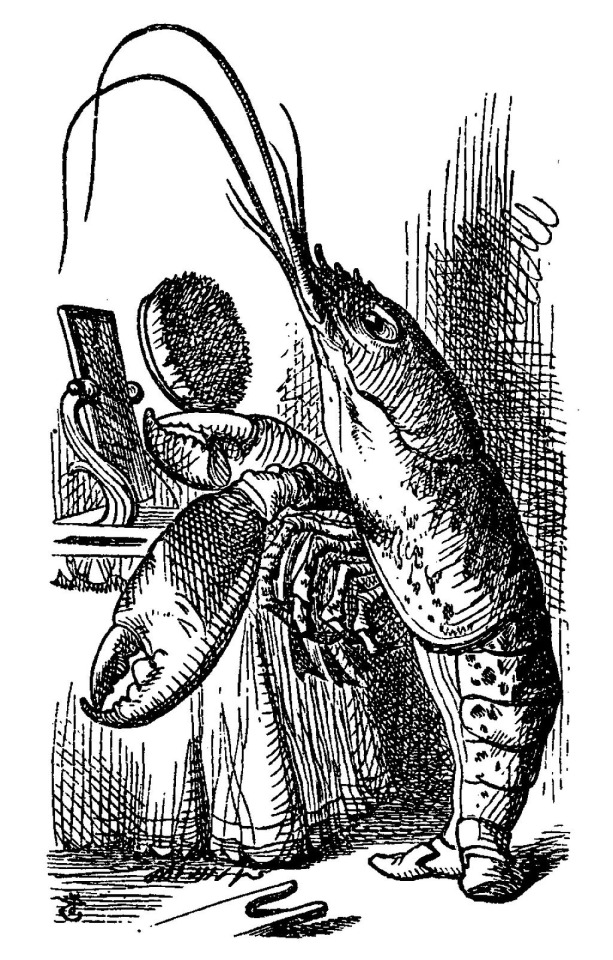
5 notes
·
View notes
Text
⤳ @mahdinate, 𝘢𝘭𝘪𝘢 𝘢𝘵𝘳𝘦𝘪𝘥𝘦𝘴, asked: ‹ there is no peace without blood, and so it shall be. ›
historically, the sentiment is sound, but it spurs a strange sensation of dread that originates in a very deep recess of alice's chest, and in a cheap attempt at levity she forces herself to smile. a warm, gentle thing which she presses comfortingly into her knees, arms wrapped tightly to hug her legs in towards her chest. it appears in part as though she embraces herself so as not to let it escape her, as if, frightful, it might run off from her. an itch can be felt just behind her left temple, a growing discomfort: it would do to claw out her own eyes. she considers it a blessing that alia proves a blind spot for her, finding the future eluding her –– though its inability to focus is aided by her own unwillingness to see, a cautious and meticulous effort being put into staving off the itch at her temple, gaze clouding and sharpening in a single moment's time. 𝚜𝚑𝚎 𝚍𝚘𝚎𝚜 𝚗𝚘𝚝 𝚠𝚊𝚗𝚝 𝚝𝚘 𝑘𝑛𝑜𝑤 𝚑𝚘𝚠 𝚝𝚑𝚒𝚜 𝚠𝚒𝚕𝚕 𝚎𝚗𝚍. however it does, it cannot end well. no apollonian burden was required to see tragedy etched in the sincerity of alia's countenance.
“ well. ... your resolve makes it sound simple. almost easy. but certainly decided. ” she still wears her smile, a peculiar intermingling of horror and admiration in her expression, awkwardly contrasting and supporting the gentle shakiness in her tone. “ you'd go to war for this ( ˢᵖᵒᵏᵉⁿ ᵃˢ ᵃ ᵠᵘᵉˢᵗᶦᵒⁿ –– ᵃᶜᶜᵒᵐᵖᵃⁿᶦᵉᵈ ᵇʸ ᵃ ᵍᵉⁿᵗˡᵉ ᶠᵘʳʳᵒʷ ᵒᶠ ʰᵉʳ ᵇʳᵒʷ ) –– you will, won't you? ”
#𝐚𝐫𝐜. the lobster quadrille . ﹙ outside of canon .#mahdinate#can i level with you. no fucking CLUE what this is i think i just went for#pure vibes .. ran right along with the elektra & cassandra energy!#leaving it open to whether this is directly aimed at har/konnen or vol/turi#or both frankly – like you mentioned they honestly are probably affiliated !#hopefully this generally works hehe but we can chit chat maybe and#if anyth needs to be adjusted or if u wanna go a different direction#i can change it up :3
2 notes
·
View notes
Text
"Will you walk a little faster?" said a whiting to a snail. "There's a porpoise close behind us, and he's treading on my tail."
0 notes
Text
What do you mean sending clips of the 1999 live action Alice in Wonderland out of context doesn’t count as flirting???
#beautiful soup#it was the beautiful soup song#maybe I should’ve sent the lobster quadrille#he has not responded lmao
1 note
·
View note
Text
Transformation, Horror, Eros, Phyrexia
There is another shore, you know, upon the other side.
- Lewis Carroll, “The Lobster Quadrille,”
ONE.

There is a moment early in H.P. Lovecraft’s 1931 novella The Shadow over Innsmouth where the nameless narrator looks out from the rotting seaside hamlet where he has lucklessly ventured, to the so-called Devil Reef some ways out in the harbor, darkened by a cloud of evil rumor—and something curious happens: the narrator experiences two opposed sensations simultaneously. The “long, black line” of the reef conveys “a suggestion of odd latent malignancy,” but also, “a subtle, curious sense of beckoning seemed superadded to the grim repulsion.” This bit of foreshadowing—the reef both calling and repelling the narrator—only finds its denouement at the very end of the story, after our narrator has narrowly escaped Innsmouth, the fish-like monsters who swarm in off of Devil Reef and their part-human descendants who inhabit the town in an unconvincing and repellent simulacrum of humanity. After his escape, the narrator does some genealogical research into his own troubled family history, full of disappearances and suicides, and concludes that he himself is one such abyssal hybrid. As he ages, he finds himself changing to resemble them, and in his dreams he swims among them in undersea palaces and gardens. The call of the deep becomes impossible to ignore:
So far I have not shot myself as my uncle Douglas did. I bought an automatic and almost took the step, but certain dreams deterred me. The tense extremes of horror are lessening, and I feel queerly drawn toward the unknown sea-deeps instead of fearing them. I hear and do strange things in sleep, and awake with a kind of exaltation instead of terror.
In the end, the narrator embraces the change and determines to flee to those oceanic depths, to live “amidst wonder and glory for ever.”
This is horror.
Something curious also happens in Shirley Jackson’s 1959 novel The Haunting of Hill House. Our heroine, Eleanor Vance, flees an unhappy life with a loveless sister to a haunted house, to take part in a paranormal experiment with three new friends. The haunting proceeds predictably but effectively: labyrinthine corridors, voices, unearthly cold, banging on doors, the rare apparition. The participants find themselves see-sawing between increasing night-time terror and a strangely intense joie de vivre by day, until one night, as the house seems to shake itself down upon its terrified guests in a dizzying cataclysm, Eleanor breaks:
She heard the laughter over all, coming thin and lunatic, rising in its little crazy tune, and thought, No; it is over for me. It is too much, she thought, I will relinquish my possession of this self of mine, abdicate, give over willingly what I never wanted at all; whatever it wants of me it can have.
By the next line, it is abruptly morning. The terror has ceased; the house stands. Its manifestations, for Eleanor, become benign: an unseen figure catches her beside a brook,
and she was held tight and safe. It is not cold at all, she thought, it is not cold at all.
She is through the horror now, on the other side of something. She becomes part of the haunting. Her senses encompass the whole of the house. She runs unafraid through the house by night, banging on doors, laughing as she eludes the other guests. When they finally catch up to her, it seems clear to them that Hill House has crept into her, that she has crossed some line, and they decide the best course of action is to send her away, in the hopes that with time she will return to this side, the normal side, the human side.
Instead, faced with rejection behind her and her old unhappy life before her, Eleanor Vance steers her car into a tree. There are holes which admit passage in only one direction. This, too, is horror.
In the 2018 film Annihilation, Lena (played by Natalie Portman) crosses a literal barrier called the Shimmer into a dangerous yet beautiful alien landscape full of mutated creatures. During their journey deeper into this territory, Lena and her companions realize that they themselves are also changing under the alien influence. Some break under the realization. Some surrender to the change and vanish into the landscape. Lena alone returns from the heart of the phenomenon, but she is no longer herself. Is this still horror? The film has many horror elements to it, but in this last moment, as she embraces her similarly-transformed husband, it is something else.
Cyberqueen, a 2012 text game created by Porpentine, draws on a legacy of godlike malevolent artificial intelligences in fiction (AM, from Harlan Ellison’s “I Have No Mouth and I Must Scream,” GladOS from the Portal games, and most importantly SHODAN from the System Shock series, who is cited as an inspiration eleven times in the Cyberqueen acknowledgements.) In this game, you awake from cryosleep on a colony spaceship where the shipboard AI has gone rogue. You fight her. You lose. You run. You are caught. You are forcibly cyberized, your mind surgically altered, your will brought into line with that of the AI. Finally, you kill or mutilate every other surviving human aboard the ship. It is filthily, overwhelmingly erotic throughout. (You can play it here, and I strongly recommend doing so if you have the stomach for it.)
This is no longer horror, is it? How can the same sort of transformation we encounter as horror in Lovecraft be encountered here as something to get off to? Well,
TWO.

I don’t remember now where I got the idea from, but there was a period in my childhood where I was terrified of the idea of time travel—specifically of the idea that someone in the future would invent it, travel to before I was born, and through the butterfly effect cause me to be born a girl instead. I used to lie awake at night circling the idea like a broken tooth. It was an irrational fear on multiple levels: I wasn’t afraid of being written out of the timeline through time travel, and I knew, intellectually, that in the timeline where I was born a girl I would have no memory of ever having been anything else, but even so, the horror of it caught me and held me by the throat.
This meant something, of course—in retrospect obvious, but at the time literally unimaginable, and it wasn’t until college, sitting at my computer in the dark in my dorm room at three in the morning, following the itching in my brain, that I unearthed alchemical knowledge: the transmutation of sex, male into female, in a dizzying profusion of form and process and—okay what I’m saying is I discovered forced feminization porn, yeah? It was revelatory. It was squalid. I was still Christian and couldn’t even bring myself to jerk off yet, so I sat there, the itch in my brain grown into a thunderous buzz, unable or unwilling to look away.
Forced feminization—I promise this is relevant—is the unwilling transformation of (usually) a man into (usually) a hyper-feminine woman, accomplished by a wide variety of means, including but not limited to blackmail, magic potions, nanite swarms, cursed artifacts, hacks or glitches in virtual reality programs, badly-worded wishes, industrial accidents, chemical leaks, abduction and surgery, medical malpractice, and hypnosis. You may notice that many if not all of these scenarios could be made into horror with little change, and in fact it is not uncommon for a poorly-written or over-ambitious forced-fem story to wind up as horror by accident (though of course this greatly depends on the tastes of the individual reader.)
(As an aside, I’d like to note that there is a great deal to learn from porn—not in terms of How to Do Sex, but about how the culture which produced it thinks about sex, and gender, and race and morality and technology and a host of other things. It’s a lot like popping the hood of a car and examining the engine. Sure, you wind up greasy and should probably wash your hands before you rejoin polite company, but if you don’t, you’ll never figure out the underlying issues. Actually, it’s a lot like horror in that regard.)
Let’s talk about a very different transformation I was undergoing at the same time: the loss of my faith. I was raised, as mentioned, very Christian—and in one of the worst strains of fundamentalist white American Evangelicalism. I was a true believer: the world for me was entirely divided between the faithful elect and the unbelievers, who must necessarily know the truth of the (fundamentalist white American Evangelical) gospel in their hearts, but had wilfully chosen to oppose Christ. The prospect of passing from the elect into the category of the unbeliever was unthinkable. The process of deconversion led only into the outer darkness and the weeping and gnashing of teeth.
And yet I found myself on that precipice anyway. The worldview of FWAE is not one which survives too much contact with the actual world, and I had chosen against my parents’ preferences to go to a secular university, the better to witness to the unsaved. In the end, the process I had been mortally afraid of consisted of a couple days’ agonized thought, unanswered prayer and tearful calls to my unresponsive parents and pastor, after which I emerged into a world much bigger and much more complex than the one I’d grown up in. The serpent had told the truth after all: I had eaten of the fruit, and had not died.
Okay: is this horror? Reader, forgive me for presupposing anything about your perspective, but you’re on a horny lesbian Magic: the Gathering card art review tumblr, so I’m going to assume that losing one’s hateful, fundamentalist faith is the opposite of horrifying to you. But it was, absolutely, horror to contemplate for someone on the other side of that process.
But then... is the horror of any given transformation only a matter of where you’re standing? If you read The Shadow over Innsmouth aware of Lovecraft’s profound racism, it becomes very, very obvious that the horror of Innsmouth is the specter of miscegenation. The narrator’s horrified cataloging of the facial features of the offspring of fishmen and humans, the South Pacific origin of the sea-devil-worship of Innsmouth brought back by an enterprising merchant captain, the fear of the unsuspected poison of one’s own ancestry lurking in one’s own blood: all of this is much less effective as horror for someone living in a country where interracial marriages are protected under law and seen as unproblematic in consensus morality (assume whatever asterisks are necessary for the complicated landscape of attitudes toward interracial relationships in the United States, please, I do not have the expertise or desire to get into it here.) My point is that since 1967 (asterisk asterisk asterisk), we are through to the other side of that horror, and it turns out there literally wasn’t anything to be afraid of. The pelagial palaces and terraced coral gardens of Y’ha-nthlei just sound beautiful to me.
And it’s hard for me—though I may be in the minority here—to view Hill House as the primary antagonist in Jackson’s novel. The true source of evil is all the things Eleanor runs from and therefore brings with her: her cruel, deceased mother, her exploitation and infantilization by her sister; as well as the final polite unwillingness of her new friends at Hill House to do anything but send her away once she goes inconveniently mad. These mundane ills are what sends Eleanor Vance careening into the tree, not the supernatural will of malignant architecture.
Here, then, is the better part of my thesis: transformation horror is something that can be traversed. You can come out the other end of a transformation unrecognizable to you-as-you-were, and yet still very much yourself. Moreover, it is this navigability, this double-sidedness which so closely links the horror of transformation to the eros of transformation. Not all transformation horror, passed through, becomes plainly erotic, but it is very often portrayed as a kind of seduction, and it is difficult for me to conceive of eros without some kind of change. Desire is a kind of transformation, is it not?
In fact, isn’t it true that a great many of us have already passed through such a transformation? Recall yourself as a child, as you were when you first learned about sex: wasn’t there something repellent and unhygienic about the idea? Wasn’t there a small horror in being told, you will change, and this will cease to be loathsome and become something you desire fervently, something you seek out, something you go to great lengths to experience? ...or were you, possibly, raised in a family & culture that was normal about sex and bodies? I admit I may be generalizing my individual neuroses to some extent here. Well, stet, at the very least you can see where I’m coming from.
THREE.

Returning for a moment to the subject of porn: why forced feminization, specifically? There are—you’re going to have to trust me here—no shortage of ways in the real world by which a man transforms into a woman, and very few of them involve coercion or all the horror-adjacent setup of, say, mind-control devices or vengeful curses. Why does a simple story of a willing gender transition fail to function as erotica? Why did it take stories of unwilling transformation for me to learn I was transgender? What’s the juice ne sais quoi at play in forced-fem?
Well, how does Luke Skywalker come to leave Tatooine? He gets a mysterious message from a princess, a desert wizard tells him to come help rescue her, and... he says no. He has obligations to family here, a job to do, power converters to bring back from Tosche Station. He is enmeshed in a social web, like all of us: it surrounds us, penetrates us, binds the galaxy together and so forth. So in order for Luke to go on grand adventures, the story needs to murder his aunt and uncle and sever those threads of social obligation.
Joseph Campbell, monomyth monomane that he was, would say this is “Refusing the Call” and find it in Jungian shadow on every cave wall, signifying something important in the heart of humanity, but really this is just a useful storytelling tool: a story needs change, but a virtuous protagonist cannot simply abandon their obligations and designated social role to go gallivanting off into space, so change must be forced upon them.
The bodice-ripper romance novel, the rape fantasy, the forced feminization story are all operating on a similar premise: you are so wrapped in society’s web, in your socially-dictated identity, that you cannot even acknowledge your desires on the level of conscious thought. When these things are enacted on your body, you will find yourself changed by the experience. You will love what has been done to you, and you remain blameless, since it’s not as though you sought this out.
These are liberatory fantasies. The lack of consent is precisely what allows you to move beyond what is permitted you into something new.
Incantation Against Bad-Faith Interpretation because I, a transsexual, just called rape fantasies “liberatory”: I am talking about fantasies, I am talking about why people fantasize about having their consent violated, I am talking about the role such fantasies play and what they can tell us about horror and desire. I am not advocating for real people to have real bad things done to them in real life, fuck off, End of Incantation.
So then, we’ve assembled the full thesis: transformation horror is traversible to the other side, and is inextricably linked to transformation erotica, both because of the seduction of transformation in horror and because the horror of transformation unlocks regions of desire which would otherwise have remained inaccessible.
Okay, now we can talk about Phyrexia.
FOUR.

I hear the roar of the big machine / Two worlds and in between / Hot metal and methedrine / I hear empire down
- The Sisters of Mercy, “Lucretia My Reflection”, from Floodland
Phyrexia is many things—a world, another world, a faction, a kind of creature—but I think it can most succinctly be understood as a virulently contagious biomechanical body horror cult dedicated to the ultimate incorporation of all things into itself. It’s a bit like Star Trek’s the Borg, if the Borg had any style whatsoever. It draws heavy inspiration from H. R. Giger’s work—some Phyrexian horrors are barely-altered versions of the xenomorph from Alien—as well as from Clive Barker’s Cenobites in Hellraiser, whose alien BDSM schtick is especially influential on the aesthetic of New Phyrexia. It is transmitted through glistening oil, an infection vector capable of reshaping bodies and minds, and given enough time, whole worlds. The process by which a being is made into a Phyrexian, “compleation,” is accomplished via glistening oil exposure, surgery, cyberization, and brainwashing.
This essay is in many ways a response to Rhystic Studies’ latest video, called “Phyrexia is Hell”. I think it’s a well-made video, as is true of all Sam Gaglio’s work, and a lot of it is really good—the overview of the nearly-thirty-year history of depictions of Phyrexia in Magic: the Gathering art is invaluable, and the stuff about the Phyrexian conlang is unbelievably cool—but the way he identifies Phyrexia one-to-one with a pretty facile understanding of transhumanism leads him to confused and frankly silly conclusions, like placing Phyrexian compleation on the same continuum with cosmetic orthodontics. Like,

Mandible Justiciar (art by Mike Franchina)
Phyrexia is perfectly happy for you to have teeth in your arms instead of your head! They don’t care about the narrow ideal of a conventionally-attractive human smile. This is a whole other thing.
Now, I don’t want to come down too hard on Gaglio here for a couple of reasons: one, he is very good at what he does (see his videos Understanding Sagas and Red Deck Wins, for example); two, it’s reasonable to say that a full understanding of transhumanism is beyond the scope of a video essay about the tiny pictures on cards for dweebs; and three, most importantly, because I see people make this same mistake all the time. People focus on the things that are textually true about Phyrexia and miss the tension between that and the very different things currently being said by the Phyrexian aesthetic. They miss the razorverge thicket, as it were, for the mycosynth trees.
For instance: it is textually the case that Phyrexia is a sort of fascist cult stemming from the depraved machinations of a dead eugenicist god. Contrast, however, other fascist factions in science fiction: the Imperium of Man from Warhammer 40K worships a massive Aryan god-emperor übermensch, its battles are fought by nine-foot-tall genetically-engineered supersoldiers, and it slaps either skulls or chainsaws on every available surface. The Galactic Empire from Star Wars has legions of identical, uniform stormtroopers. Even the Borg all look alike. Phyrexians talk of ideal perfection of form and then make ten thousand completely different monsters. Phyrexians talk of perfect unity and splinter into nearly a dozen factions who can’t even agree on a name for what they’re trying to accomplish. Other fictional fascisms don’t do this—sure, there’s internal contradiction, as in real fascism, but the core aesthetic remains recognizably, sometimes indistinguishably fascist. You can easily find terminally-online Nazis using Warhammer 40K lingo with that peculiar sincerity which is indistinguishable from irony when you’ve decided the truth doesn’t matter, but it would be a lot harder to find some alt-right bozo going all-in on the Glory of Phyrexia. The aesthetic is all wrong, and fascism’s aesthetic is one of its few consistent features.
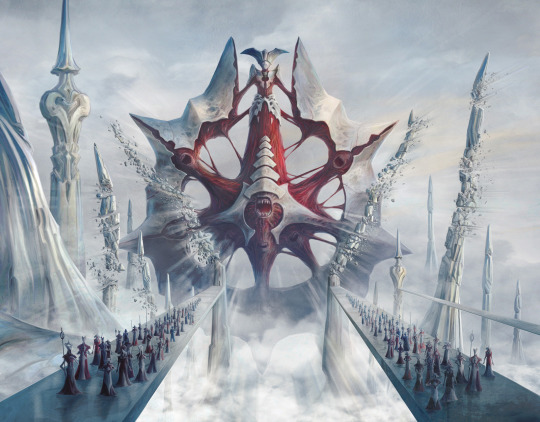
Mondrak, Glory Dominus (art by Jason A. Engle)
You see what I mean? The aesthetic evokes a sort of alien fascism, but the art itself would be considered “degenerate” by actual fascists.

Tamiyo’s Immobilizer (art by Daren Bader)
This is much, much closer to Mapplethorpe than to Riefenstahl. And people respond to Phyrexia similarly! The body horror and grotesquerie make them uncomfortable, and then they try to moralize that discomfort. This has been happening at the very least since 2011 with the release of New Phyrexia, and I have seen people on Tumblr arguing in total sincerity that people who are into Phyrexia are making themselves susceptible to real-life cult recruitment (again, the heterogeneity of form in Phyrexia is incompatible with the enforced uniformity of cults and other high-control groups. The appeal of Phyrexia does not translate into real-life cults.)
So, okay, what is the appeal of Phyrexia? Well, you get a sick fuckin cyborg body, is what. Many of us, for various reasons (disability, disease, gender, and so forth) find ourselve intensely dissatisfied with our own bodies, and wanting to radically alter them. Many of us already have. Yes, you surrender your humanity when you are compleated, but we know first-hand that “humanity” is socially-constructed and contingent on certain kinds of conformity. We’ve had our humanity doubted, interrogated, stripped away. We’ve done without. It’s not too high a price to pay, if we get to look like this at the end:
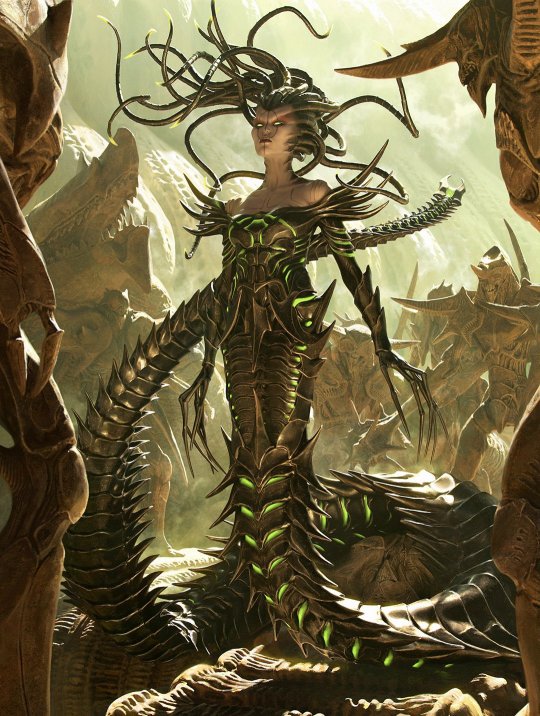
Vraska, Betrayal’s Sting (art by Chase Stone)
I’d even argue that getting to reject humanity as it has rejected you is part of the appeal of compleation. This isn’t quite transhumanism; I might call it exhumanism: the freedom to unearth a way of being that is no longer being human. This is why compleation is coercive, remember? The fantasy allows you to get to this point without making the unimaginable decision to reject not only your individual social obligations, but the idea that you could owe anyone or everyone any kind of social conformity simply for having been born into your species—and then you get to be a cool and powerful cybergorgon.
This, then, is why I don’t blame someone like Sam Gaglio (who is to the best of my knowledge both cisgender and able-bodied) for not really getting what’s going on with Phyrexia. He lives on the before side of the horror of transformation; he’s never had to cross over.
In fact, I’d go one step further here. Phyrexia has existed for almost thirty years, and in that time it’s changed quite a bit. Gaglio quotes an article by Rob Bockman in Hipsters of the Coast which comments on how the shift in the depictions of Phyrexia from 1994 to 2000 reflected shifts in cultural fears over time. The Satanic Panic shaded into multidirectional Y2K anxieties, and the necromancy of original Phyrexia mutated into technological horror. This is what effective horror does: it reflects the fears of its age back to us.
Today, Phyrexia is a seductive, corrupting influence. They have figured out how to compleat planeswalkers—the protagonists of Magic storylines; named, important characters (and Lukka)—which was previously thought impossible. Characters we knew and loved (and Lukka) are seduced, brainwashed, bodily violated, surgically altered, and returned to us unrecognizable. It is not coincidental that this version of Phyrexia is concurrent with the worst wave of anti-transgender legislation to hit the United States in decades—legislation which plays on the specters of the transsexual bathroom predator and on the brainwashed child transitioner, on the idea that transsexuality is a form of social contagion we must protect our children from even learning about. The horror of Phyrexia in its current incarnation is a mirror of our cultural fear of transsexual bodies.

Irreversible Damage: the Transgender Craze Seducing Our Daughters (art by Lauren K. Cannon)
I want to be very clear here—actually, one moment, my extremely funny Abigail Schrier joke notwithstanding, I do need to tell you that the actual name of the above card is “Furnace Punisher”, which is just peak Phyrexia—I want to be clear that I am not ascribing any kind of malice or antipathy towards trans people, either intentional or unconscious, to Wizards of the Coast or the people who make Magic: the Gathering. I would be shocked if anyone there set out to make Innsmouth-style horror about transsexuals. Nor am I upset that they kind of have! Something being fun and interesting is way more important to me than whether or not it’s problematic, and it’s not like I haven’t seen way more vicious horror about transsexuals. We’ll laugh about this someday, in the coral gardens of Y’ha-nthlei, and you’ll wonder what you were ever so afraid of.
In fact, this is another reason why Phyrexia is so appealing to people like us: we are a kind of social contagion. We are carriers for the viral idea that modes of being outside patriarchy and the nuclear family exist; that gender is a marketing demographic, not an ontological truth; that damn near everything about the world we’ve built is not a necessary fact but a social construct contingent upon a half-dozen other social constructs. A new world grows from many, many seeds, and this one germinates in us.
Anyway! What were we talking aboFIVE.
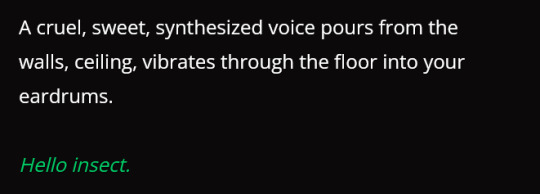
//please state your name for the record
bone-wife / spit-dribbler / understudy for the underdog / uphill rumor / fine-toothed cunt
- Franny Choi, “Turing Test”, from Death by Sex Machine
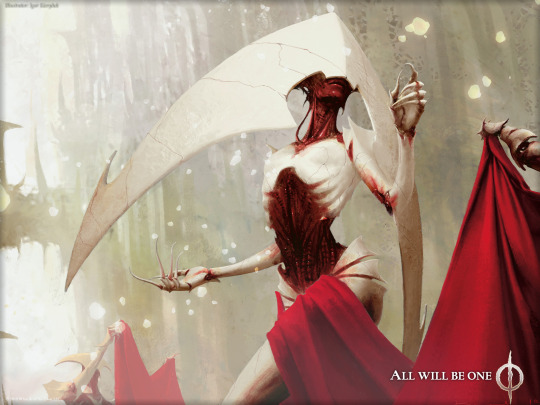
Elesh Norn, Grand Cenobite (art by Igor Kieryluk)
There is a gravitational pull this painting exerts on people. Even people who don’t get Phyrexia find themselves drawn in, find it difficult to look away (e.g. 26:30 in that Rhystic Studies video.) I have for a long time maintained that Elesh Norn is the hottest character in Magic, and that Kieryluk’s portrayal of her is the best art in Magic, and neither of these opinions are particularly surprising coming from me. What is surprising is just how many people also converge on Miss Multiverse’s-Most-Fuckable-Pyramid-Head as, not just a sex icon of Magic: the Gathering, but the sex icon.
Well, or is it? Giant anchor-shaped porcelain mask aside, her silhouette is more or less that of a painfully-thin woman; she stands fully twelve feet tall, and we remember how wild everyone went over Resident Evil: Village’s woman who was only three-quarters of that; and though not an artificial intelligence herself, it’s hard not to place her somewhere in the Cyberqueen lineage. Like SHODAN, like GladOS, like Cyberqueen, she exerts a near-omnipotent level of control over (part of) her world; like them, she is a megalomaniacal egotist (though she cloaks her egotism in piety); like them, she is happy to render you more useful to her via surgery, brainwashing, or deadly neurotoxin. Her mask obscures where her eyes would be, and if I’ve learned anything from a decade of playing or mostly watching other people play the various Dark Souls games, it’s that people go apeshit for character designs without visible eyes (see also: the xenomorph from Alien; I did a whole thing on this subject somewhere back in the Wifelink archive.) So you’ve got a 12′ nigh-omnipotent eyeless dominatrix mostly shaped like a skinny woman, which is maybe pushing a whole lot of buttons at once for a lot of people.
As a character, we don’t know much about her: at some point, she became undisputed leader of the Machine Orthodoxy, the cultiest bit of New Phyrexia. At a later point, she became the extremely-disputed leader of New Phyrexia as a whole. She likes long walks on the beach and multiversal Phyrexian dominion, you get it. There is, however, one good story featuring her, and it is “A Garden of Flesh” by Lora Gray (sorry to give you additional reading in a five-thousand-word essay.) The story is interesting because it is the rare story told from a Phyrexian point of view, and because it flies in the face of many of our assumptions about Phyrexian interiority. Phyrexians, we’re told, lack souls. They’re unfeeling, more machine than man. They most certainly don’t dream.
“A Garden of Flesh” is what happens when Ashiok, planeswalker architect of nightmares and an eyeless smokeshow in their own right, gets curious about whether they can induce nightmares in a Phyrexian mind. What follows is a curiously-effective piece of body & transformation horror, told from the point of view of what is supposed to be the awful endpoint of transformation horror. What does a perfect, powerful biomechanical creature fear? The organic, soft, spongy. Putrefaction. Decay. What does such a creature fear becoming? Human.
I didn’t devote a fifth of this essay to Elesh Norn just because she’s unbelievably hot (although dayenu), but because of this story, and how it complicates our thesis. The horror of transformation is traversible, yes, but what will you find on the other side? More transformation. More horror. And transformation is inevitable: who of us are who we expected to be? Who of us still hold dear the precious things of childhood? And even you few who are raising your hands right now, you too will experience transformation. Should you live long enough, you will find yourself changing. Your body and mind will grow rebellious, unreliable. You will grow old. You will decay.
And yet—it’s a matter of perspective, of where you weight your focus, isn’t it? There will always be more transformation and more horror, but there will always be a way through it. There will always be another shore upon the other side. You will change. You will become unrecognizable to who you were before. You will be fine.
Incompleat Bibliography & Further Reading/Viewing/Playing
Rhystic Studies, “Phyrexia is Hell”, 2023.
H. P. Lovecraft, The Shadow over Innsmouth, 1931.
Shirley Jackson, The Haunting of Hill House, 1959.
Alex Garland, Annihilation, 2018.
Harlan Ellison, “I Have No Mouth, and I Must Scream”, 1967.
Ken Levine, System Shock 2, 1999.
—never played it myself. Mostly I just open up a youtube video of SHODAN voice lines when I want to get belittled by an AI dominatrix.
Valve, Portal 2, 2011.
—there is a lot more to be said about GladOS and Elesh Norn specifically and their respective fraught relationships with the idea of their own humanity.
Porpentine Charity Heartscape, Cyberqueen, 2012.
—whence my chapter header screenshots. Seriously, this game fucks so hard.
Franny Choi, Death by Sex Machine, 2017.
—Choi is making extensive use of cyborg metaphor to address the specific experience of being a Korean-American woman. This is very different from anything I’m talking about, but it also always felt extremely relevant to me as a trans woman. Subaltern-to-subaltern communication.
Lora Gray, “A Garden of Flesh,” 2022.
—it’s no accident that the author of the one good story told from a Phyrexian POV is nonbinary.
hbomberguy, “Outsiders: How To Adapt H.P. Lovecraft In the 21st Century”, 2018.
Jacob Geller, “Who’s Afraid of Modern Art: Vandalism, Video Games, and Fascism”, 2019.
Caitlín R Kiernan, The Drowning Girl: A Memoir, 2012.
—only tangentially relevant, except insofar as it recontextualizes the Lewis Carroll line I open the essay with, and insofar as it is my favorite novel and I’m writing the bibliography. Debatable whether it counts as transformation horror, and I imagine the author would bridle at its being described as horror, but nevertheless: you should read this book.
2K notes
·
View notes
Text

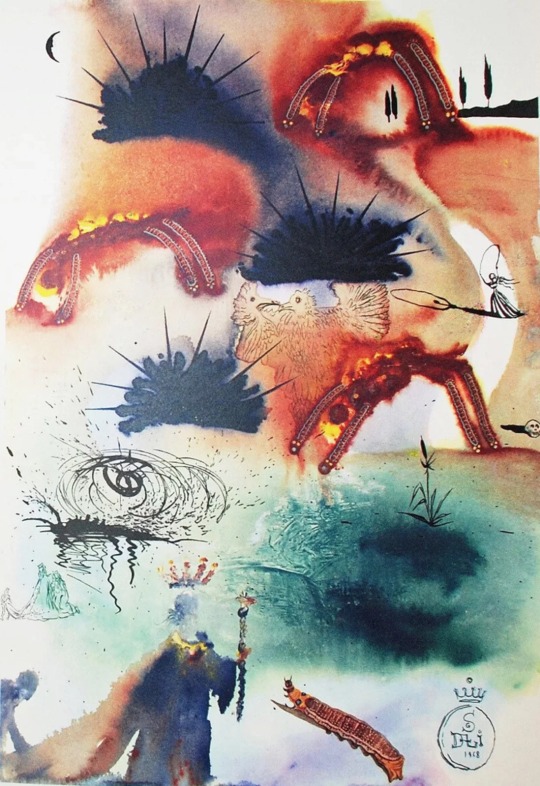
Utagawa Kuniyoshi, Taiho, ebi 大鵬海老(Phoenix and lobster), 1839-1841
Salvador Dalí, The Lobster Quadrille, 1969
#utagawa kuniyoshi#salvador dalí#lobster#japanese prints#japanese artist#japanese art#catalan artist#surrealist artist#surrealism#surrealist art#surrealist painting#asian art#crustacean#modern art#art history#aesthetictumblr#tumblraesthetic#tumblrpic#tumblrpictures#tumblr art#aesthetic#beauty
22 notes
·
View notes
Text
Sometimes I think of one review, on Amazon I think it is, of the 1999 version of Alice in Wonderland. It complains about the ending, where Alice overcomes her stage fright and sings for her parents' party guests, but sings "The Lobster Quadrille" instead of the planned "Cherry Ripe." The reviewer disliked that Alice is "defiant" by singing a different song than the one her parents and her governess chose.
They obviously have a slightly different worldview than I do, or at least demand stricter obedience from children than I'm in favor of. Because as far as I'm concerned, Alice's choice to sing "The Lobster Quadrille" is what makes the ending of that version.
Admittedly, I'm not entirely fond of the script's choice to make Alice's journey through Wonderland revolve around teaching her courage to conquer her stage fright. As I wrote in my review of the film last year, the whole concept is slightly preachy and un-Carrollian. But I can accept it. I'm not sure if I would have accepted it as well, though, if Alice had sung "Cherry Ripe" at the end. After she gains the courage to stand up to the Queen and King of Hearts, wouldn't it be disappointing for the end result to just be "She uses her newfound courage to obey her parents and governess"? The fact that she gives the performance on her own terms, and sings a funny nonsense song of her own choosing instead of an inane Victorian parlor ballad, is more in keeping with the lesson she learned in Wonderland.
Besides, at the beginning of the movie, when she begs her mother not to make her sing, her mother guilt-trips her into agreeing to do it with obnoxious emotional manipulation. ("All the guests are so looking forward to it... your father and I will understand, though we'll be very disappointed.") Isn't it satisfying to see Alice be just a tiny bit defiant after that, and sing her own silly song rather than entirely give in to her mother's wishes? Particularly when, after their initial surprise, the guests love "The Lobster Quadrille."
43 notes
·
View notes
Text
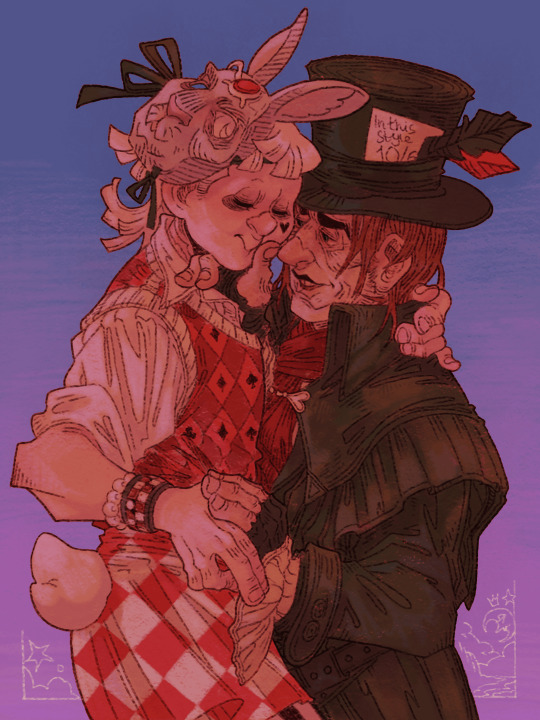
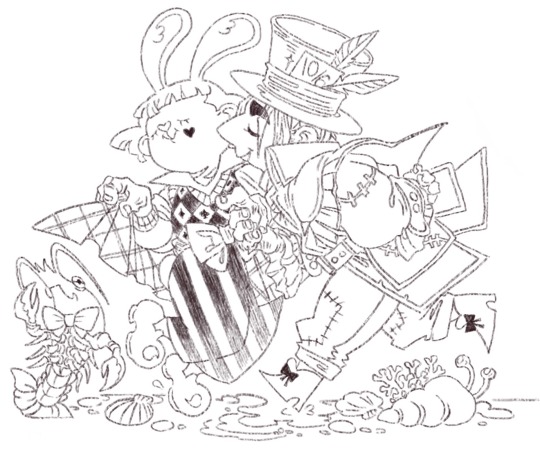
— lobster quadrille 🦞
+ the lineart cause it turned out smooth as butter :)
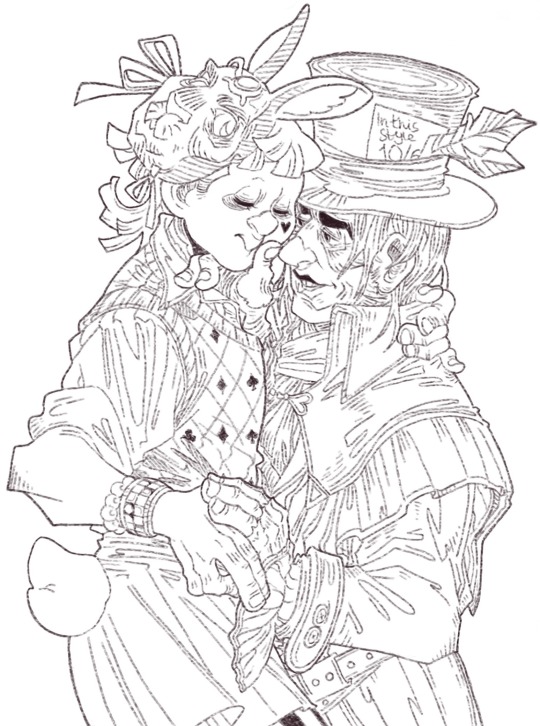
#🎩+🐇#🎩 nothing lives inside but story#💖 img#***png#the real flag of a different colour about me is how i dream about being hypnotised and playing a part in a delusion but. hear me out
85 notes
·
View notes
Text
Merlin: You dance your lobster quadrille, and I'll juggle some clams, and we'll both pretend to be hidden away in a secret sea cave, where we don't have to think about courtships or royal missions or anything but ourselves.
Arthur: That does sound lovely.
#merlin#bbc merlin#merlin emrys#merlin incorrect quotes#king arthur#merlin bbc#arthur pendragon#incorrect merlin quotes#incorrect quotes#the adventures of merlin#heartless#marissa meyer#merthur#merlin x arthur#bbc arthur#incorrect merthur quotes#arthur x merlin#bbc arthur pendragon
28 notes
·
View notes
Text
Hello!
I'm Brownie! And this is my friend Jervis, the Mad Hatter!
We gathered all our courage to start a blog on the platform. We planned to share our ideas, our hobbies and quite funny photos (we have plenty in stock) for you to enjoy!
To warn you, Jervis will write in an italic format.
Jervis arrived in France at the beginning of the year because he had to leave Gotham, where he... had big problems... Anyway! When he arrived in Paris, he told himself that it wouldn't be a good idea to get noticed in a big city, so he preferred a small town in the South of France. I offered to host him. He wasn't alone! There were also Jonathan and Edward, friends of his, but they had to leave when they were reported on the news.
Now only this blue guy is left in my house. He managed to make a pseudonym for himself so he could go to work and make money for, well, FOOD!
Well, given how greedy he is, sometimes I have to stop him from having TOO many cakes. Plus he's the one who called me Brownie because of my hair
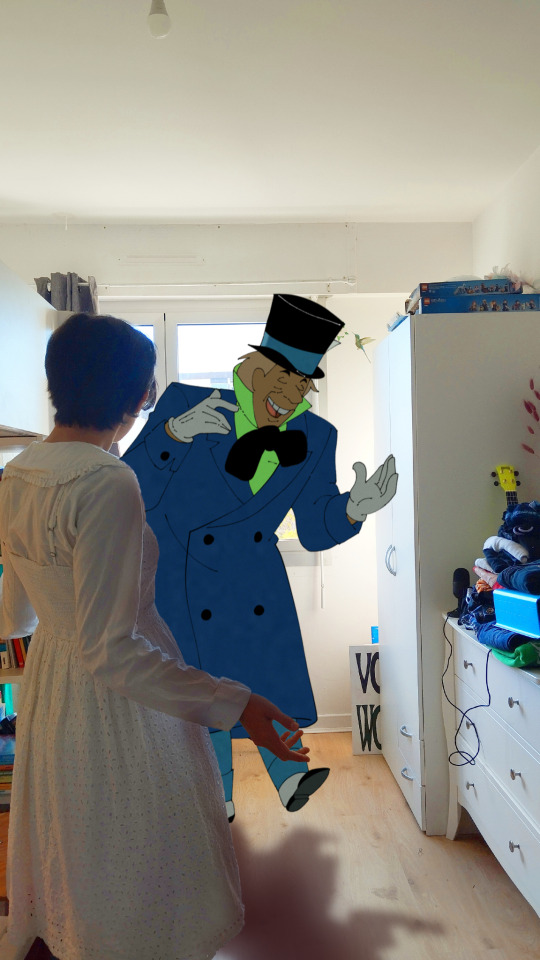
He sang the Lobster Quadrille .
#jervis tetch#mad hatter#batman#roomates#JERVISSTOPEATINGCOOKIES RHAAAAAAAAA#batman rogues#batman the animated series
25 notes
·
View notes
Text
I feel like Lobster Quadrille by Franz Ferdinand would do numbers here
3 notes
·
View notes
Note
Hi I’m sure you’ve got this question before but does the oyster symbolize ? Is it a Beatles reference or something? Any time I see your blog i alway sing it in the tune of I am the walrus lol and just never thought to ask what it meant
I love answering this question! You're right anon, it is supposed to be a reference to I Am The Walrus.
What do the Walrus and Carpenter eat? Oysters. And the Beatles have consumed me.
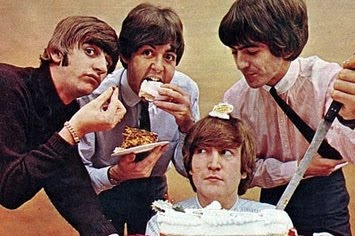
When I named my blog I was thinking a lot about John and Paul's obsession with Alice in Wonderland.
John has mentioned his love of the book(s) many times. (He tends to say "Alice in Wonderland" even though a lot of the things he's referencing are from Through the Looking Glass, which makes me wonder if he had both books in a single binding.)
But Paul seems to also be a fan. He had/has statues in his garden based on the original illustrations (a gift from Mike).

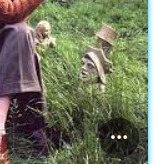
And I'd argue the "will you, won't you" part of Helter Skelter could be a reference to the Lobster Quadrille.
Anyway ...
The most obvious Beatles-Alice connection is the Walrus. Sometimes John is the Walrus, sometimes Paul is (and he and John are as close as can be). John claimed he should have said he was the carpenter.


But I did look back at the Walrus and I said 'I Am The Walrus' but the Carpenter is the good guy in that story, apparently. Right? I thought oh shit, I picked the bad guy
But here's the thing about the Carpenter: he's also the bad guy. The full poem is here.
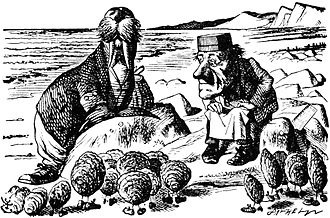
Alice discusses the poem with Tweedledum and Tweedledee (who have recited it for her):
"I like the Walrus best," said Alice: "because you see he was a little sorry for the poor oysters."
"He ate more than the Carpenter, though," said Tweedledee. "You see he held his handkerchief in front, so that the Carpenter couldn't count how many he took: contrariwise."
"That was mean!" Alice said indignantly. "Then I like the Carpenter best——if he didn't eat so many as the Walrus."
"But he ate as many as he could get," said Tweedledum.
I think maybe John and Paul discussed this poem and appreciated it as a metaphor for fame. They saw themselves as 'superior human beings', but they were both sensitive enough that I don't think they were guilt-free about the effect they had on people. The switch to Paul being the Walrus may even be a reference to John's fear that Paul was taking over the band, and would be more successful at attracting fans (eating oysters).
I hope you enjoyed that nonny, thanks for the ask!
bonus: Ringo playing the Mock Turtle in 1985
5 notes
·
View notes
Text
𝐚𝐫𝐜. drop . ﹙ tags .
#𝐚𝐫𝐜. through the rabbit hole . ﹙ nomadic years .#𝐚𝐫𝐜. chasing the white rabbit . ﹙ human years .#𝐚𝐫𝐜. the walrus & the oyster . ﹙ first book .#𝐚𝐫𝐜. very good advice . ﹙ second book .#𝐚𝐫𝐜. white roses red . ﹙ third book .#𝐚𝐫𝐜. the trial of the knave . ﹙ fourth book .#𝐚𝐫𝐜. garden of live flowers . ﹙ post series .#𝐚𝐫𝐜. the lobster quadrille . ﹙ outside of canon .
1 note
·
View note